Longer than expected!
Description
About travelling in Morocco at the time of Corona ... and Ramadan
Content:
Before
On the road with Lydia
Pre-Ramadan
Ramadan
Post-Ramadan
After
Before
Travelling is a great tradition in my family. Ever since I can remember, we have often been on the road, just like I am now, alone, as a couple, with family or with friends. ...but always in a defined period of one, two, or three weeks. Corona made this impossible for me, as for everyone else, at times, or at least made it very difficult. In November 2020, I managed to travel to Morocco at least for 2 weeks with a PCR test, just in time for the peak of the big wave, which ran almost parallel in Germany and Morocco. Everything went according to plan. I saw my friends and was back home safe and sound after 2 weeks, went into quarantine and took another test.
Shortly after my return, my travel fever forced me to make new plans. In February, I was to go to Oman. I closely followed the development of the travel restrictions because of Corona. Suddenly I was checking the Corona statistics and Foreign Office pages daily to see if my plan could work. By mid-January it was clear that I would either have to stay at home or find a new destination. Oman had closed its borders. Tunisia required a week of quarantine in designated hotels. Only Morocco was easy to reach. A negative PCR test was enough and there was not much to prepare for, as I already knew the country. Spending some time there with my friends was a nice idea. Very uncomplicated.
It all started quite simply, like any trip, with booking a flight ticket.
My plan was to first visit my friend Renate and her husband Michael, who had emigrated from Germany to Morocco in November 2020, and then to see my Moroccan friends again. Since there were no flights to Morocco from German airports in February 2021, it made sense to look for a suitable flight in a nearby country. I found what I was looking for in Brussels: Direct flight to Essaouira, where my German friends now live. How convenient. From there, I then wanted to make a round trip through Morocco to cultivate my good contacts in Merzouga, Marrakesh and Tangier.
Enthusiastic about the idea, a friend from Germany joined me at short notice to have at least 10 days of respite from the Corona stress and the worry about her sick mother. I hadn't booked a return flight because I didn't know yet whether it would be 3 or 4 weeks until I would have visited everyone. That was the plan.
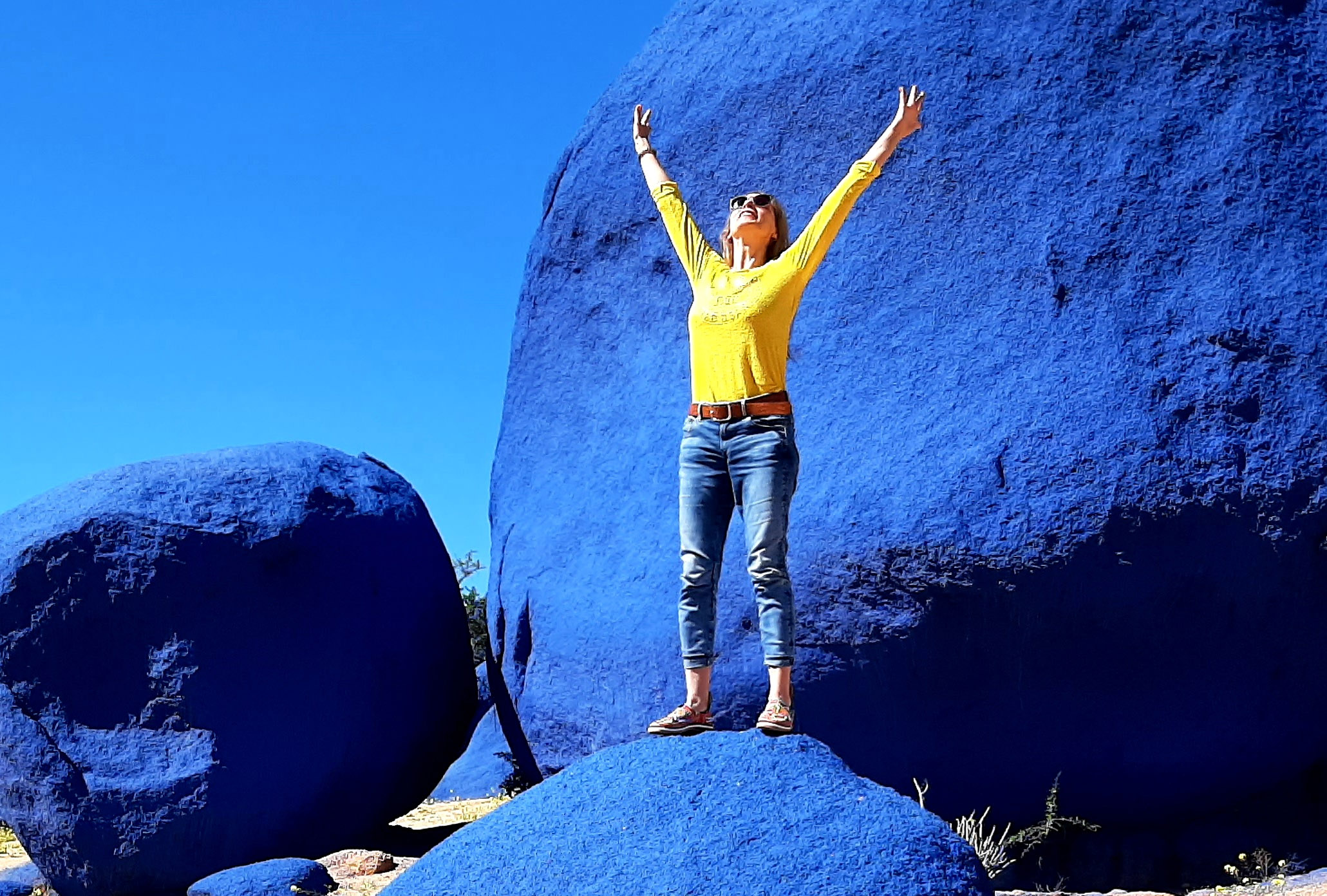
On the road with Lydia
On 20 February 2021 we set off. My husband Heiner takes us to Brussels at 3am. We arrive at the airport very early with all the prepared entry and transit formalities and, of course, the confirmed negative PCR tests, and are practically alone because there are no other flights apart from ours. Peu à peu a few fellow passengers arrive, but everything is relaxed and free of complications, just like the flight over Brussels, which is still in darkness. You could draw a road map from the pictures, so clear is the view of the illuminated traffic arteries.
On arrival in Essaouira, we are subjected to a Corona rapid test, which fortunately also turns out negative. The entry form with details of where we have stayed in the last 2 weeks, mask requirement, hand sterilisation - everything is done or followed.
Renate and Michael pick us up at the airport and off we go.
They live about 10 km outside of Essaouira in a beautiful house with a pool in a 4500 sqm garden. Paradise! We already regret wanting to leave after 2 days, but everything is planned with the 10 days Lydia has in mind. Fortunately, I can come back once I have visited all my friends.
The main thing is that we arrived in time for Michael's birthday and can celebrate with him today with a delicious meal on the beach in Essaouira. Because of the Corona measures, catering is only possible outside. But with the weather here, that's just the thing. We take another long walk along the beach. Then I show Lydia the port of Essaouira. Here, too, the corona protection measures cannot be overlooked. Access is only possible from the beach side. Many of the usual small restaurants are missing, as are the visitors who normally come here. Nevertheless, the port is always worth a visit.
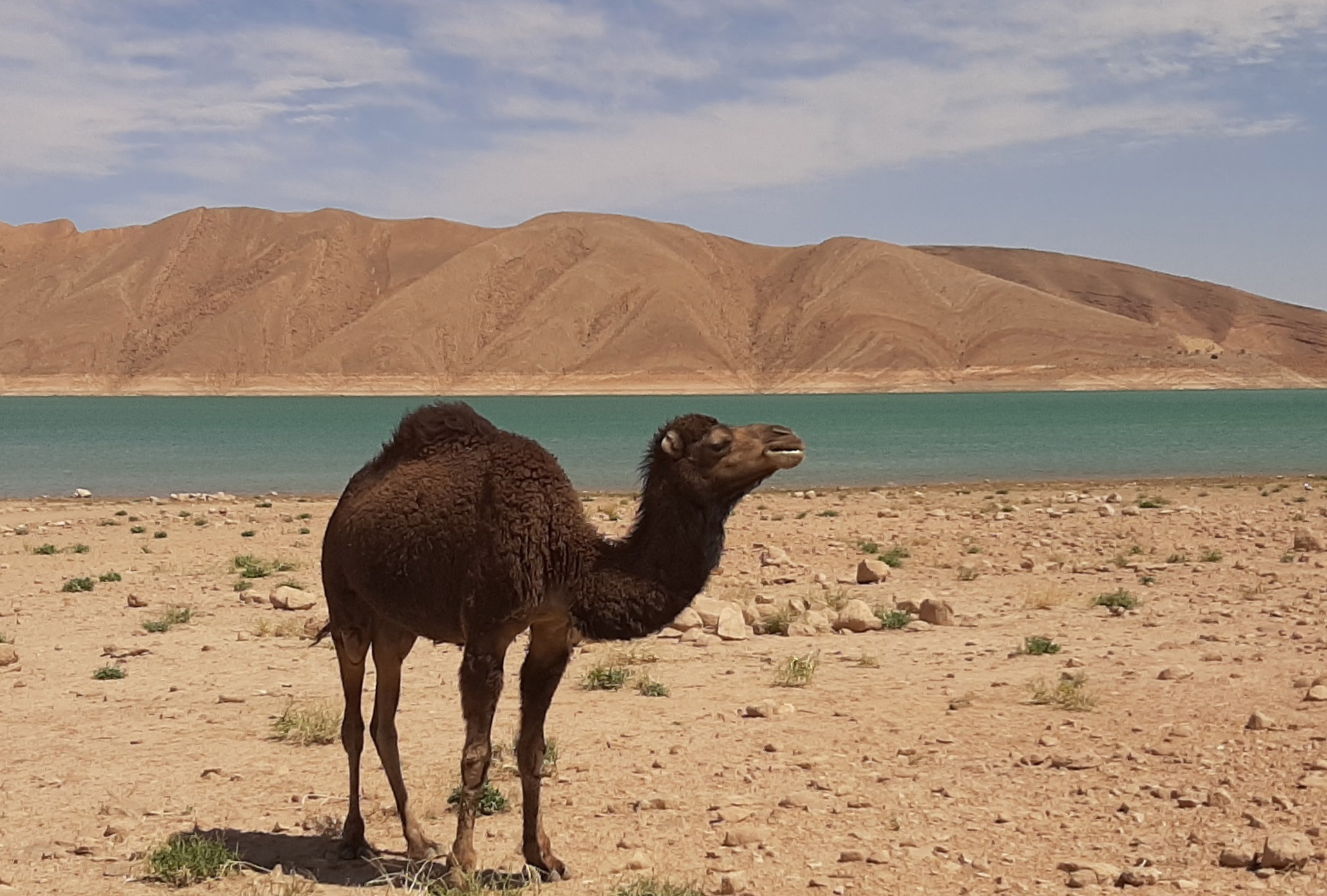
The next day, my friend Ahmed picks us up in Essaouira to take us on a 4-day tour through the Antiatlas towards Merzouga. Of course, we have to put on masks during the trip, at least when we come in sight of police checkpoints, which are plentiful in Morocco. Compliance with the Corona measures is strictly controlled, masks are compulsory everywhere and travel restrictions for Moroccans, but also the observance of speed limits. In towns and villages, the speed limit is always 60km/h until there is a new sign far behind the town. (If there is one) So you are well advised not to accelerate directly behind the end of the built-up area. This will be expensive, at least for Moroccans, for whom the fine is very high in relation to their income.
The first destination is Kerdous, a hotel at 1200m altitude, which has been run by Moha since August 2020 and still needs some renovation to meet the demands of European guests as a hotel. The potential of the house is terrific: the location 1a+, not to be topped, with a panoramic view of the mountains. The building is charming, colourfully painted in soft orange as is usual here in the area. Some workers are busy improving the condition. The rooms are spacious and all have en-suite bathrooms, although they are in dire need of renovation. There is a very nice terrace with a large pool... and the truly unique view. Once the rooms are in good condition, it will be a tip for all travellers in Antiatlas.
Since the hotel has a concession to sell alcohol, it stands on 2 legs, so to speak - overnight stays and serving/selling alcohol.
Overnight stays and serving/sale of wine, beer.... I am very surprised how much Moroccans like to buy beer or wine here. It didn't quite fit into my picture. Since there are no other houses with alcohol licences nearby, this is a secure source of income, even if the tourists stay away. The next day we continue to Tafraout, the capital of Moroccan shoe production, including the colourful embroidered shoes I got last time. Lydia can't resist.
The next destination are the Blue Stones, an art object in the rocky landscape by the Belgian artist Jean Vérame, who painted some granite monoliths in the landscape in 1984 predominantly in a brilliant blue, so that you can see them from a distance as you approach. In the meantime, the colour has been refreshed by residents of the area - but this does not detract from the fascination of the place.
Then we continue through the Gorges ait Mansour, an oasis in a gorge, overgrown with countless palm trees, some with burnt trunks, which nevertheless sprout again at the top. There is a small restaurant, running water, dogs and cats. To enjoy the place, we ask Ahmed to let us get out and drive ahead. We want to follow on foot. It is worth walking a longer distance here so as not to miss the little impressions, water dripping down the rock face, algae in a puddle, a young Moroccan couple with a baby who like to chat a bit, turtles by the wayside..... How nice that we have the oasis to ourselves.
In Taliouine we set up camp for the evening in a hotel attached to a campsite. The most impressive thing are the rooms painted in bright colours. ... to each his own colour. Ahmed poison green, Lydia bright pink and bright blue for me. Here, too, the distance signs, one-way rules for the guests in the restaurant are marked everywhere. Masks are obligatory.
The next day we drive via Taznakht to Tamnougalt. In a casbah ruin we discover wonderful graffiti and murals. It looks as if an event of this kind had recently taken place here. Artists were really at work. Only a few pictures have been destroyed by overpainting or wild spraying.
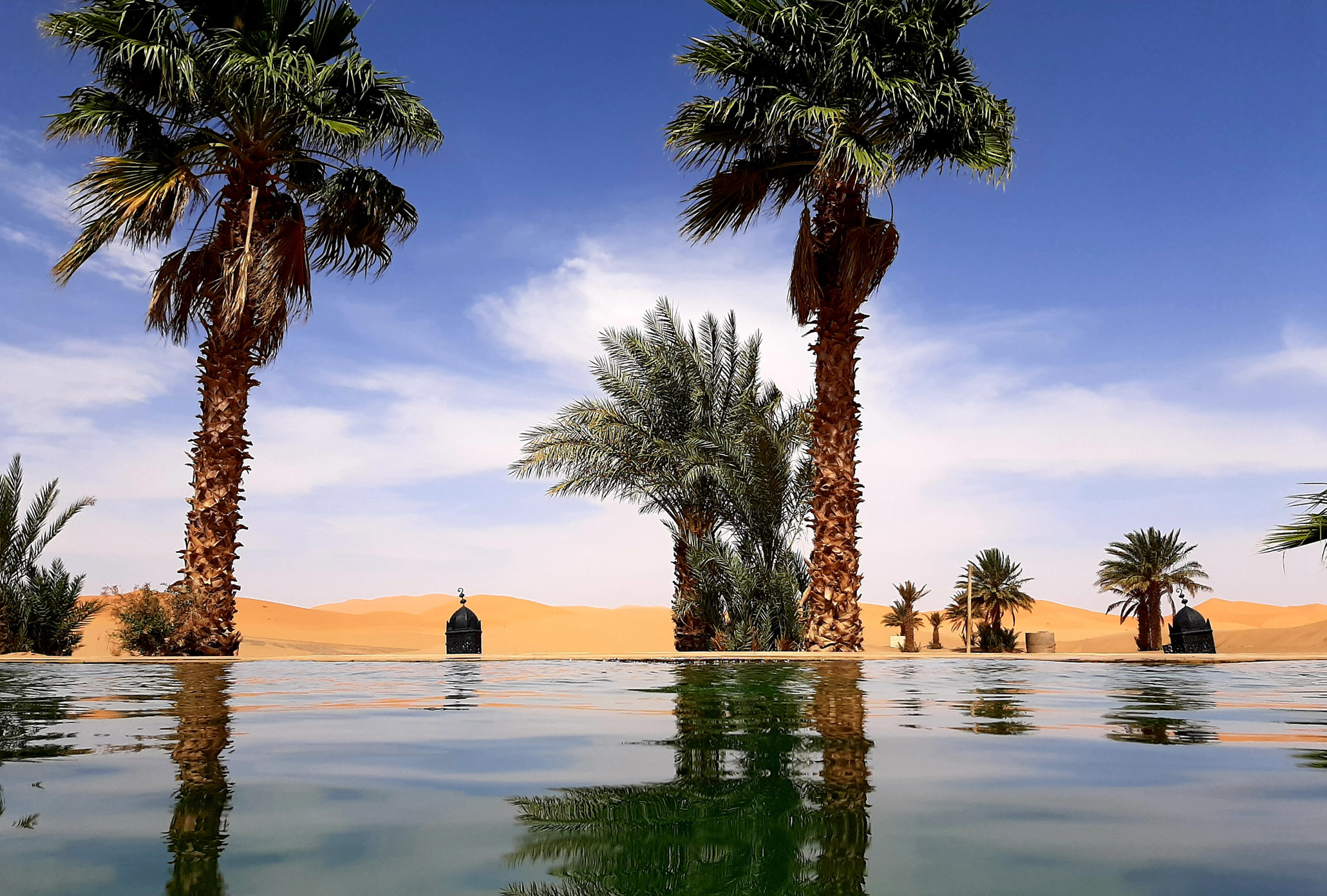
For lunch we stop in Nkoub, a small town with a large market place. Maybe it is not the right day, or the demand is lower because of Corona. In any case, most of the stalls are empty, the butcher's shops are closed. A little boy playing near our table gladly accepts the invitation to partake of our food. Meat doesn't seem to be on his daily menu that often.
The route to Sidi Ali leads us into the desert as you would imagine it: Dunes, nothing but sand and rubble, hardly any plants.
The Kasbah Mahabout hotel just opened in 2020, bad timing. In addition to the building made of stones with clay plaster, there is also a roundel of tents behind it. Many overnight stays cannot have taken place here yet. Our rooms are beautiful and huge. Whenever I am in the vicinity, I would definitely like to stay here again, even for a few days. This time, unfortunately, it can only be one night, because we want to go to the market in Rissani the next day and afterwards the Hotel Kanz Erremal is waiting for us in Merzouga. Ahmed has organised a great tour for us. But that doesn't mean that the plan is fixed. In the meantime, we discuss again and again whether we should stick to the plan or whether there are other possibilities.
It is anything but an off-the-peg package holiday.
The drive to Rissani takes us through the village of Fezzou. Somehow I have the feeling that Friedensreich Hundertwasser, an austrian artist, has also been here.... at least there are many decorative elements that look familiar to me.
In Rissani I buy my spices as usual in the big souq. After all, I want to fly home again in a good 2 weeks. Who knows if I will get this selection and quality again. (Since then, a pound of cumin, among other things, has been in my suitcase, scenting the laundry).
Dates are bought, of course of the best quality, and Ahmed does some shopping for the hotel in Merzouga. Masks are also worn here in the souq. To be noticed at a checkpoint without a mask would simply be too expensive for the Moroccans. 300Dh fine, for many 1/10 of their monthly income.
On the way to the car, we pass the donkey market and watch the men haggling and trading. An apparently very dissatisfied donkey, which I avoid in a wide arc, does not mean well with me. He turns to face me and kicks out hard, hitting me in the pelvis. Fortunately, the distance was large enough to avoid major damage. A bruise is all that remains. I don't know what bothered him about me.
Another visit to the sheep market, which is on the outskirts of town because of Corona, instead of in the souq as usual. There, keeping the minimum distances would simply not be possible. Here in the fresh air with plenty of space it is no problem. For our European eyes, it takes some getting used to seeing how the sheep and goats are presented here. Short ropes are knotted at regular intervals to ropes anchored in the ground. These are attached to a leg of a sheep or goat so that the animal cannot move from the spot. Some manage to free themselves and then run around until they are caught again and brought back. The real attraction of the market is us: Lydia and me. Tourists are just extremely rare specimens.
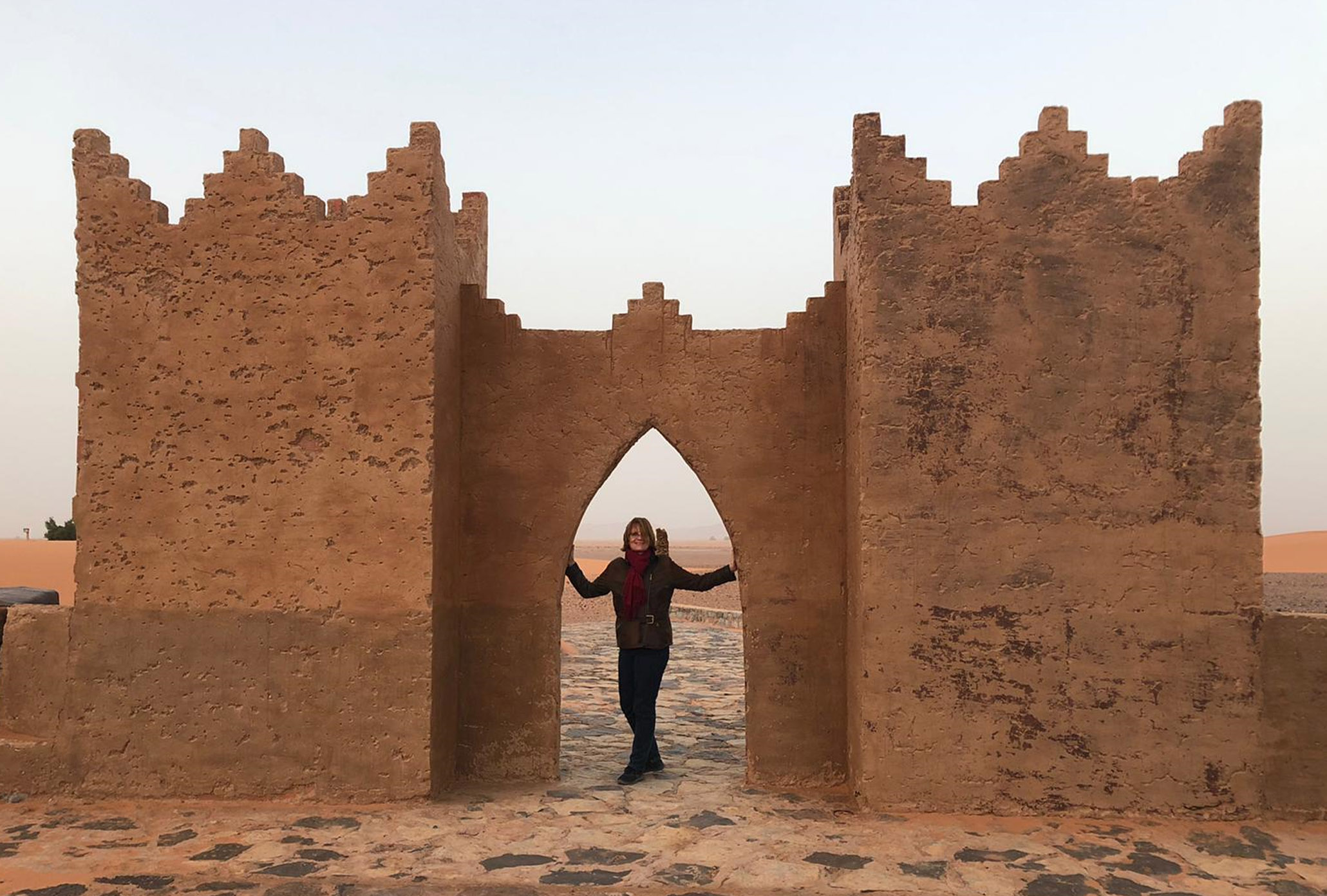
Finally, we visit an exhibition house of old and new Berber culture. There are almost endless quantities of carpets, crockery, clothing, jewellery....... and the obligatory Berber tea with peppermint. The serving of this tea alone is worth seeing: after the tea has steeped and some large pieces of sugar have been added, it is poured from the pot into a glass.... and back again from the glass into the pot. This is repeated several times. It is to improve the distribution of the tea flavour and the sugar. Finally, the tea is poured from the pot into the glass with a lot of spacing to produce the desired foam on the tea. You could really call it a tea ceremony.
In the afternoon we arrive safely in Merzouga and check into our rooms. As there are a few Moroccan guests apart from us, I don't end up next to Lydia, but up on the roof, room 23 - the most beautiful room in the house with a view of the desert and the dunes.... Grandiose!
We have arranged to have tea with Ali and his friend Said, whom I have known for more than a year and with whom I have always kept in touch. However, it takes a while until it gets cosy. The tea is to be taken on the high dune.... so we have to earn it first and walk up..... walking is an exaggeration, creeping would be a better word. It is very strenuous in the soft sand. The Moroccan guests of the hotel have hired camels for the purpose and take up position on another dune .... all want to see the sunset. ... but a Berber tea boiled on straw in the sand with a few sweets and almonds is only available with us. The atmosphere is incomparable.
Back at the hotel, we have a delicious tajine with fresh salad, lots to talk about and a bottle of rosé, which we bought beforehand in a small restaurant with a serving licence.
To see the sunrise, I don't even have to leave my bed.... just turn around and look out - it doesn't get any better than that.
For today, Ali and Said have invited Lydia and me on an excursion. We don't know what's on the programme. They want to surprise us. First we buy some food and drinks in the village. Then we leave Merzouga and drive to the area near the Algerian border. Some Berber families live here who are used to having tourists visit them from time to time. This serves not only to satisfy our voyeuristic needs, but also to provide economic support. As a thank you for the tea and the couscous served - after all, today is Friday, the day when couscous is eaten in most Muslim families - the families get some money from the boys and us. In addition, I had wisely taken some pencils and erasers with me to distribute. One of the families uses them right away. We meet 6 children of different ages, from 2 mothers with a husband. As usual, the tasks are distributed in the family. The man is out with a flock of sheep, one woman with the goats and the second woman stays with the children in the "house", a shelter made of mud and wood. I start drawing animals with the children... on the inside of a packet of chocolate, which they have previously divided peacefully among themselves. This makes visiting fun.
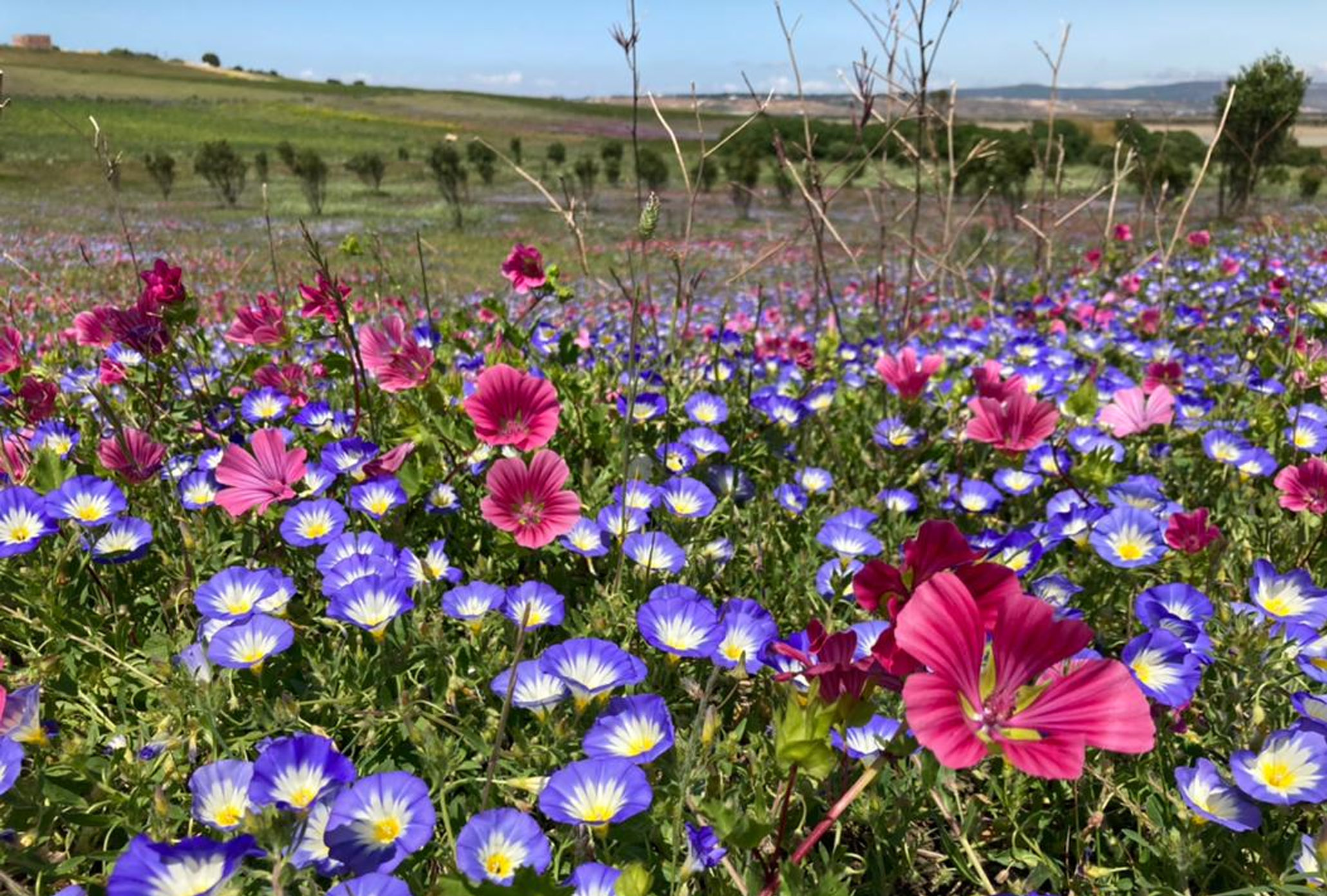
We continue into the stone desert at the Algerian border, where we set up camp within sight of the Algerian border guards, prepare tea, enjoy a barbecue with meat skewers and listen to a mix of North African music and dance to it. It's incredible what you do when you're feeling really good.
We are back at the hotel in time for dinner and don't know where to put the tajine served here. The whole day we went from one meal to the next. That is Moroccan hospitality.
Because it was so nice, we arranged to meet Ali and Said again later in the evening for a campfire. The boys bring 2 bottles of wine and water, sweets and almonds. They really want to spoil us. We feel wonderful, laugh, sing and dance. In a more serious conversation, Ali and Said tell us what life is like for young adults in the Sahara. Unlike in the somewhat freer north, customs are still very strict here. Young men can only go for a walk with a young woman or girl or invite her to tea when marriage has been decided. For this purpose, the partners are brought into contact by the families. After marriage, the woman moves into the man's family. Life in extended families is quite normal. On the one hand, Ali and Said say they regret not being able to casually socialise with girls, but on the other hand they cannot imagine any alternative to this life. No wonder they spend their time with friends or tourists.
When we get back to the hotel around midnight, it looks deserted. No wonder! The Moroccan tourists have already left and the staff are sleeping in the adjoining buildings. Fortunately, someone remembered to leave the door open for us.
For the next day, Ahmed has thought up the day's programme for us. First we drive with a 4x4 to the foot of the Erg Chebbi, a dune landscape formed by the wind, which reaches a height of up to 150m. I had already made the ascent to the summit in November and was very surprised then how strenuous it is to walk up the ridge. I don't do that this time ... you can also enjoy the view further down. Then we drive to Café Nora, just outside Merzouga. Here the speciality is Berber pizza, a bread dough filled with vegetables and meat. As is customary in Morocco, this dish is also eaten by hand. Washbasins to wash your hands before and after eating are available everywhere, even in the smallest street restaurants.
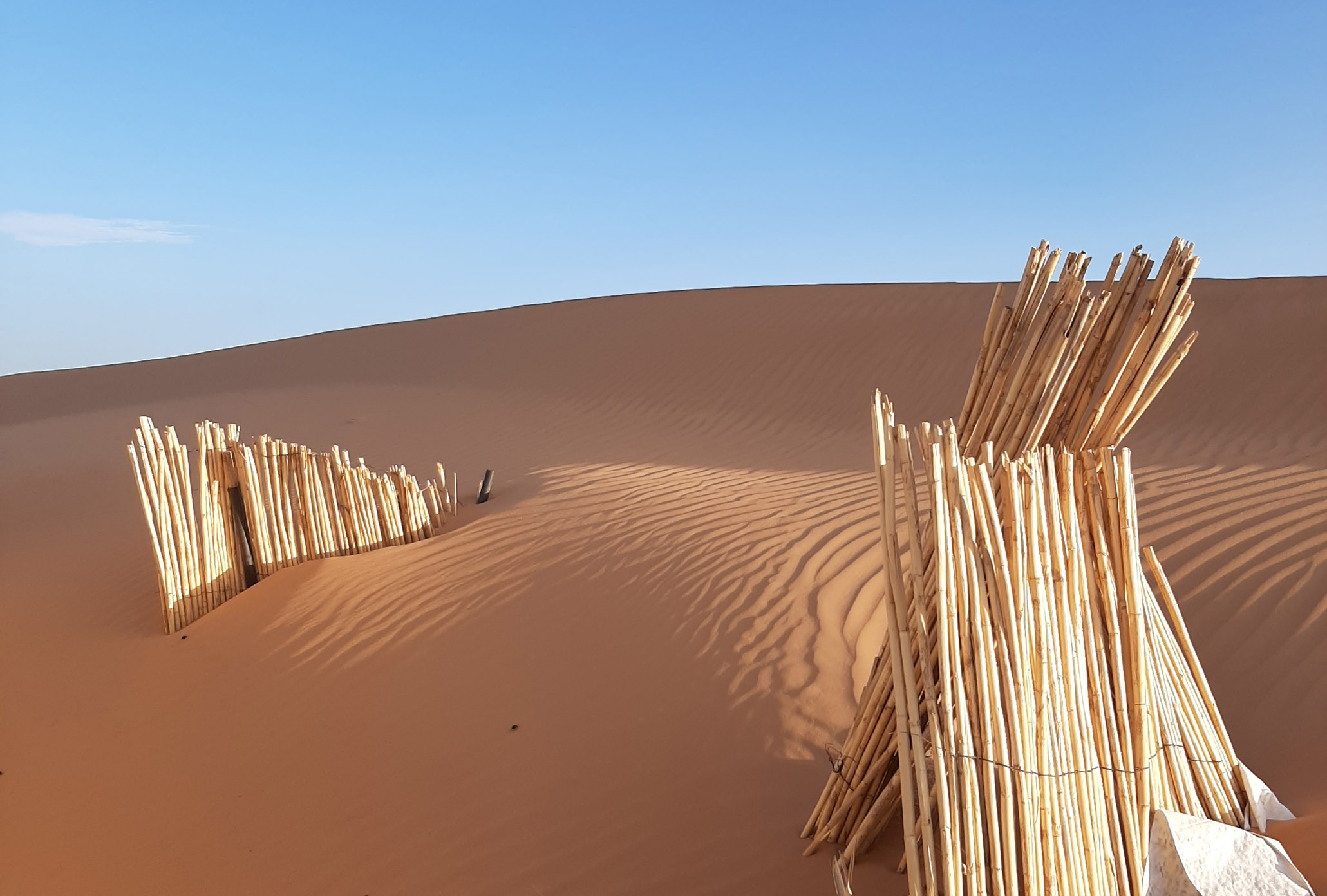
A few houses away there is a café where musicians wait for a few listeners, who then enjoy the rhythmic Gnawa music over a Berber tea, a traditional and spiritual music that originated with the slaves. Afterwards, we thank them for the performance with an appropriate tip and the next group can come. This time, however, no other group has arrived - there are simply far fewer tourists than usual.
The evening is again spent around a campfire. This time at the Hotel Kanz Erremal, where a group of mostly young Moroccans from Casablanca organise the evening with their own DJ and campfire. Some of them speak English or French so fluently that one can assume they have at least been to an international school or even studied abroad. In contrast to Ali's and Said's descriptions, the young women of this group are dressed in western style and are at ease with the young men. Only a few wear a headscarf, sometimes combined with crisp jeans or a short skirt.
We have to leave Merzouga. Corona was not an issue here because there are almost no cases of infection. To be able to fly back in a few days, Lydia has to get a PCR test. Ahmed does some research, makes some phone calls and then finds one in Errachidia at the airport. They make the 120km in 2 hours to hopefully have the result in time for the departure flight. It is a bit exciting.
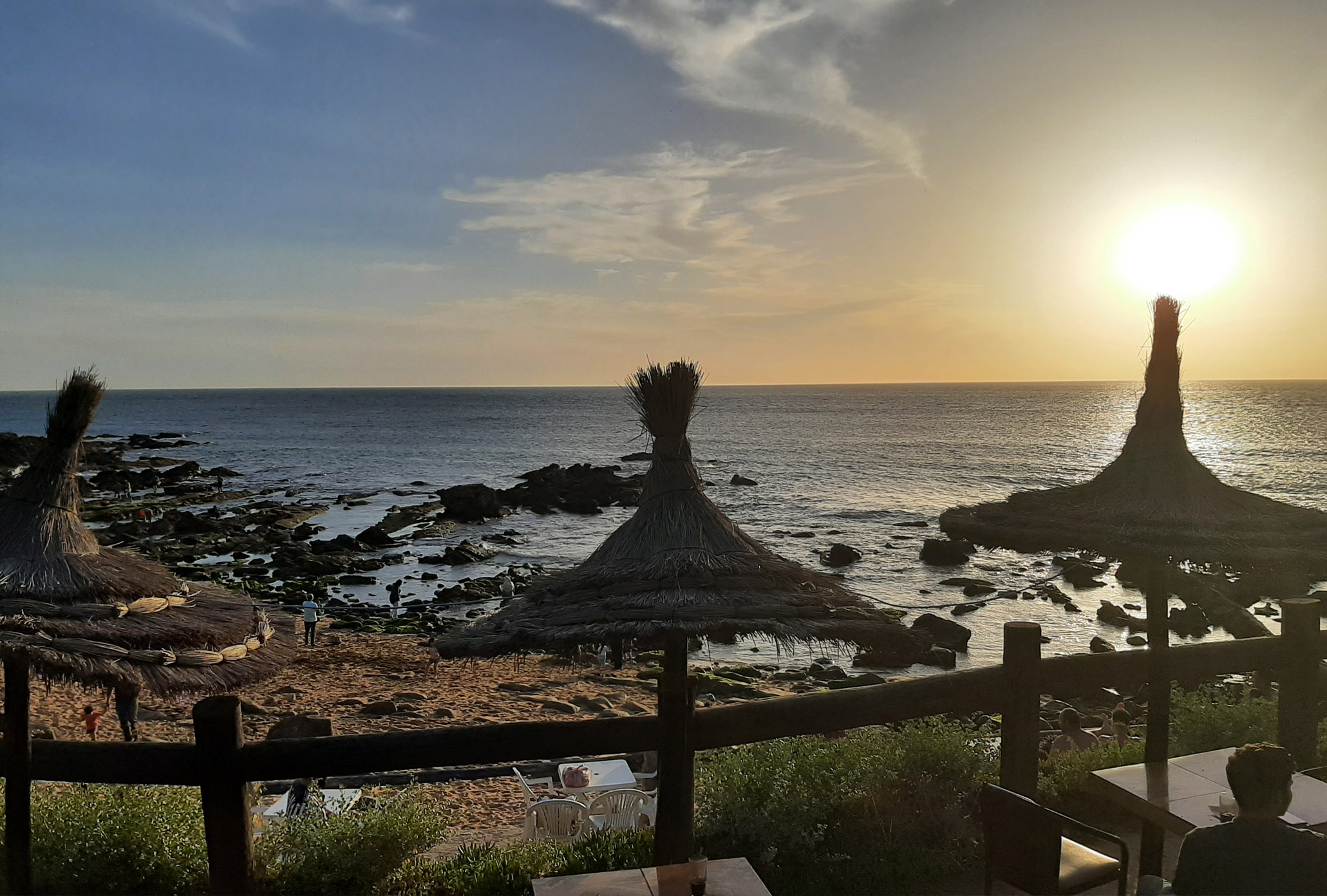
We set off in a northerly direction. Lydia's flight in 2 days to Frankfurt has been cancelled in the meantime because the border to Germany was closed by the Moroccan government on 1 March. There won't be flights to Germany until 10 April. Fortunately, there is a replacement flight on the same day from Casablanca to Brussels. That worked out for the best. I decided against breaking off my trip and want to take the risk of staying a little longer in Morocco. 10 April is OK within the framework of my schedule.
Via Rissani we arrive in the Béni Mellal Khénifra region in the centre of Morocco.
Ahmed has organised the overnight stay at the Hotel Météorite Boulajoul near Midelt, a hotel easily recognisable by the fact that in front of the building an old R4 on a pedestal looks out into the landscape. This is a sign that this hotel is a staging post in the great international R4 rally, which, like much else, cannot take place at this time of Corona. The hotel is generously laid out, around a central garden, obviously not long in operation and in correspondingly good shape.
In the morning we drive to Khénifra. Lydia has to be at Casablanca airport at 5am the next day. I want to go on to Ifrane. So we enjoy a last lunch together in Khenifra. From there, Ahmed drives with Lydia to Casablanca to spend the night there and not miss the flight at the last moment. In the course of the afternoon, the news comes that the flight to Brussels has been cancelled for the same reason. No flights to and from Belgium. Now there is only the possibility to enter Europe via France or Spain. When booking the flight to Paris - Lydia has become a pro at online bookings - it turns out that it is only available for travellers with a registered address in France, exceptionally also for foreigners who have to show a very valid reason to be able to travel. So in the evening she asks her mother's palliative care doctor to issue her with an appropriate certificate, with which she can then take the flight in the morning. It worked. After many forms, mask checks, a sightseeing tour because the stay in Paris was so long, she finally arrives home after about 17 hours... and I continue my trip alone!


































































